A blue and yellow Ukrainian flag flies from the hydrangeas-lined house owned by William and Lyuba Wharton in Gainesville. Their garage is full of stacked boxes with winter jackets and canned food. Inside, family photos line the walls above Matryoshka dolls on shelves, and warm smells of pirozhkis in the kitchen accentuate fond memories from a homeland overseas.
In a home computer are hundreds of pages of letters sent to the Whartons. Their contents are heartstrings extending from Ukraine to Florida since Russia invaded the country a year ago.
“Almost every night, I close my eyes, and I am afraid to fall asleep,” Tatyana Popovich, a schoolteacher from in Toretsk, in the Donetsk region of eastern Ukraine, wrote in one letter. “I still have feelings of fear and anxiety for my daughters,” Popovich added. “It is me who needs to take care of them. I must be strong and not show my fear and feelings to them. I must teach them, bring them up to become good and kind, honest people. With God’s help, I will succeed.”
Lyuba Wharton, 65, grew up in Toretsk, and her sister and friends still live in Ukraine. She and William Wharton, 91, a native of West Virginia, are both leading members of The University City Church of Christ, the Ukrainian ministry in Gainesville.
At home, the couple and other local volunteers constantly pack boxes to send to people in Ukraine. The Whartons know many of the recipients through their prior mission trips there.
Lyuba’s phone is always close by – and yet voicemail messages are constant. One could be from a local volunteer ready to come help pack more boxes. Or from her nephew, in Ukraine saying he and his daughters are safe. When she checks email, it’s often someone sending a letter, expressing gratitude for the couple’s efforts.
The letters also depict the atrocities of war, and ask the Whartons to pray for their safety. Other times, the writers worry they won’t make it out alive.
On Feb. 24, Ukraine’s world went dark. While the country had been under siege from Russia for nearly eight years, it was nothing like the large-scale military assault that day, as bombs rained upon Kyiv, the capital, and many other areas in Ukraine. Since then, the war has devastated many towns along the border. Russia has annexed four regions of Ukraine: Donetsk, Kherson, Luhansk and Zaporizhzhia, though it does not fully control any of them.
Florida is home to more than 58,000 Ukrainians. It also has a growing population of Russians. Both nationalities used to consider themselves as one, but now stark borders have now left a distinct contrast. For many in Florida, they struggle with the juxtaposition of knowing that while they are safe from danger here, there’s very little peace in their homeland thousands of miles away.
And yet while navigating the heartbreak and helplessness, and though unsure how to offer true aid, they continue to find ways to spread love and cherish their native land and heritage.
Listen below: Lyuba Wharton reads a letter from a teacher, Yana Kravchenko, from school 10 in Toretsk. “Thank you very much. I want to believe my little ones, my mom and I will not freeze. I really hope that your kindness and attention to our family will return a thousand times to you,” Kravchenko said.
‘You need to do something’
Lyuba Wharton moved to Gainesville in 1997. She first met William Wharton on a mission trip to Ukraine. His church was visiting different regions and she translated for the English-speaking missionaries. Back stateside, Lyuba later began working for the University of Florida as a translator. Not long after, in 2009, William asked her to spend the rest of her life with him.
“I began to realize that she was beginning to sort of put down her own roots,” he said. “I thought: I don’t think I want her to do that – so I asked her to marry me.”
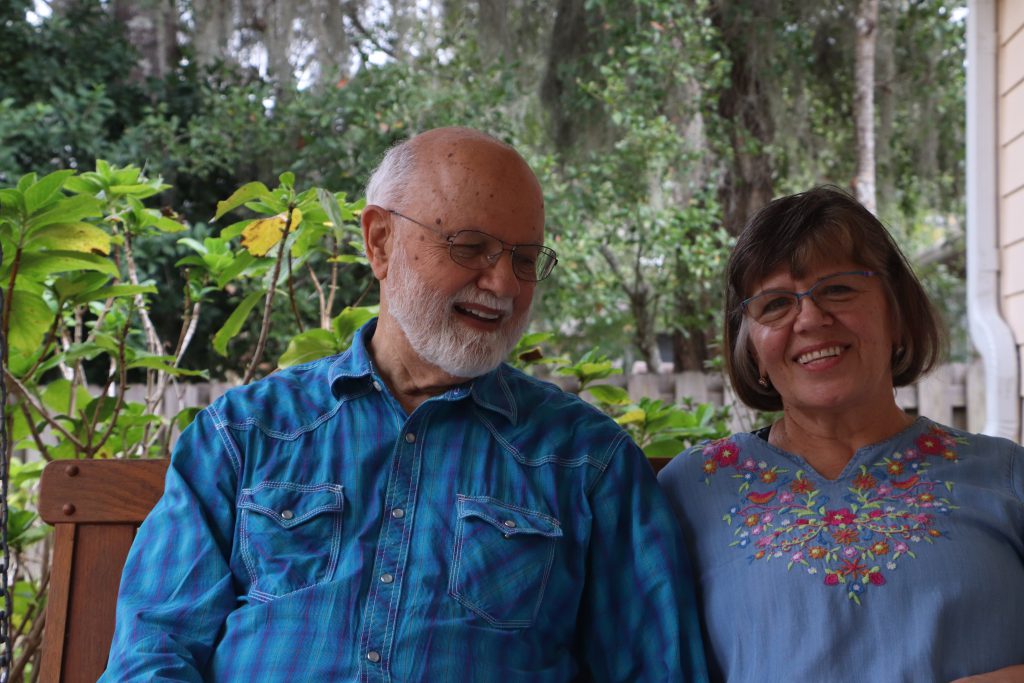
They raised two children, both of whom graduated from UF, now live in Valdosta, Georgia, and are helping with the relief efforts. “You need to do something to feel like you are part of it,” Lyuba said. “It will be more difficult for us not to do anything than to do so much as we do.”
William hosts Bible studies online for people in Ukraine. He and Lyuba also work as liaisons between families in different parts of the country who cannot communicate with each other.
“If they were somewhere where there was internet, they were able to call us, and we would tell them where their loved ones were,” Lyuba said. “We were kind of a link between so many people, and helping them while they were on the run. We helped a lot of people.”
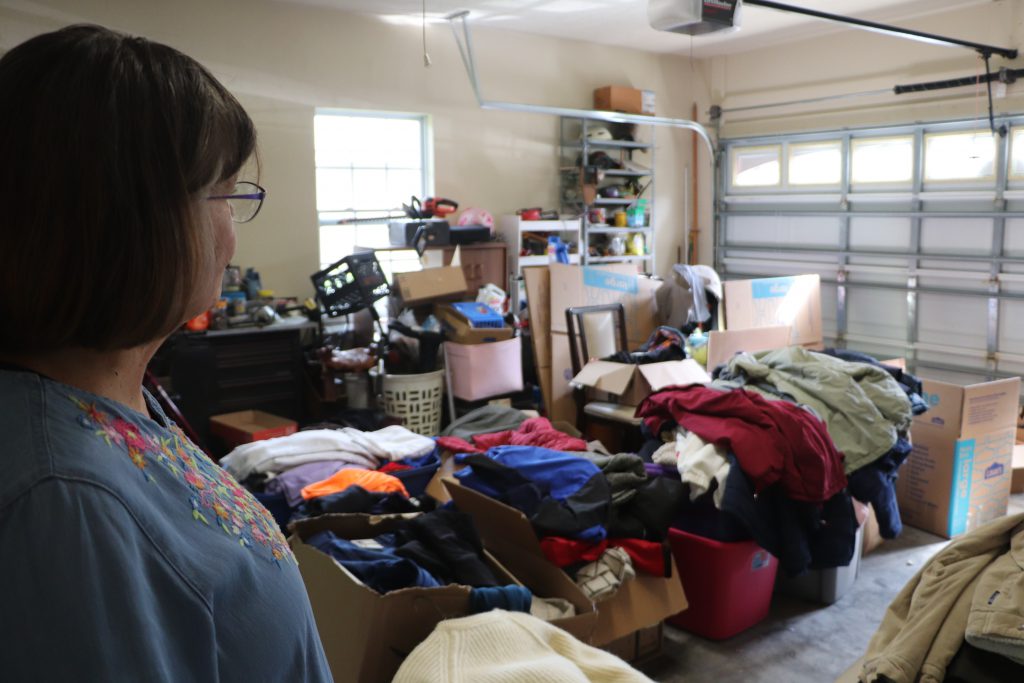
Bittersweet memories
Lyuba Wharton was born in Donetsk and to a family of coal miners.
“I guess we were poor but had no clue about it,” she said. “I think we were very happy.”
Wharton spent the majority of her childhood speaking Russian. While she knew how to speak Ukrainian, everyone spoke Russian, she said. It was understood across borders.
As a student at Sumy State University in North Ukraine, she studied languages and pursued a teaching career. “It was a lot of fun,” she said. “People were joyful.”
However, it wasn’t always that way.
After Wharton and her friends checked into a rental apartment while visiting Latvia one weekend during college, the hostess told them to not speak their language, warning that they might get hurt if they did. Why would anyone oppose speaking Russian, Wharton wondered.
The next day, as a sea of people were awash in colors and culture at a parade in downtown Latvia, her eyes came upon a halting sign: “Get away Russian occupants.
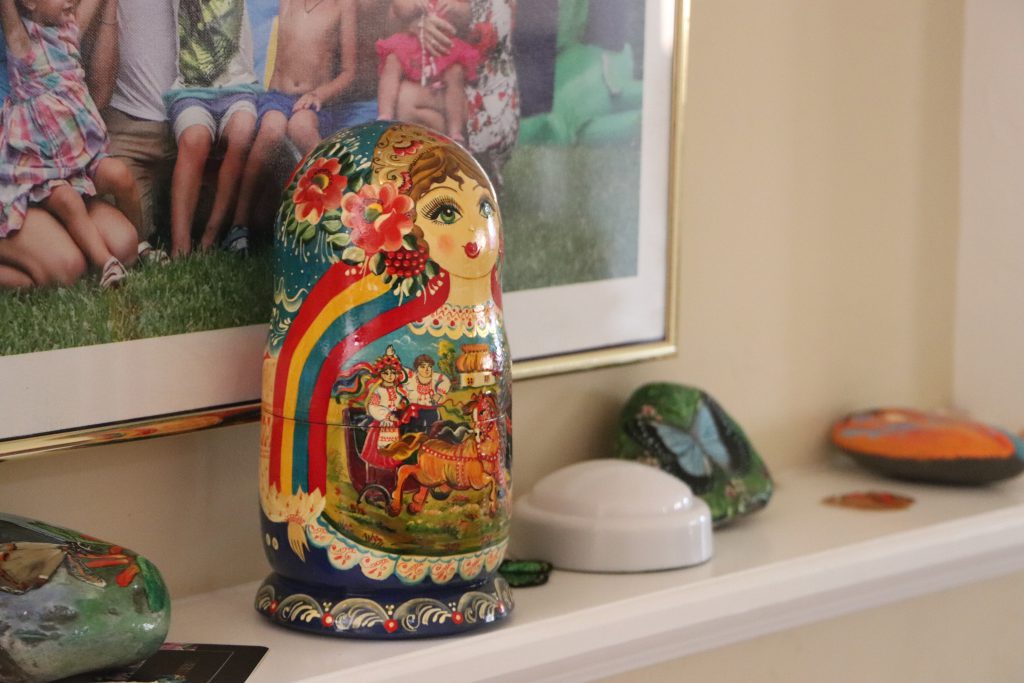
During the Second World War, Russia demanded that Latvians join the Soviet Union. Many resisted – and were sent to internment camps to die.
At the parade, Wharton’s group followed the crowd to a railroad, where hundreds of Latvians threw flowers onto the tracks, in memory of those who died during the war. She felt torn. Gone were her school days of everyone only wishing each other good things and acceptance.
“I think God sent me to the country at that time, to see nothing is that Rosie color in this country,” Wharton said, referring to the divide between Latvians and Russians. “I think that was the first shocking event that helped me to understand that we just don’t know what’s happening.”
Before the current war, Russia, Ukraine and border town names were used interchangeably to describe where someone was from, Wharton said. These days, however, there have been invisible lines drawn in the language, and people are distinct in describing their origins, she said.
“If you’re from Ukraine, you don’t want to say that ‘I’m from Russia.’ Definitely not,” Wharton said. “Now, when somebody calls, and they greet me in Ukrainian language, I immediately start speaking Ukrainian with them. And I kind of like it.”
Desolate moments
During fall 2021, Wharton said she heeded Ukrainian President Volodymyr Zelensky’s calls to not worry about a Russian invasion. However, her friends and family in Ukraine told a different story, especially when troops from both sides gathered on opposite sides of the border.
The day the bombing started, Wharton couldn’t reach her sister, but one of Lyuba’s friends called from Ukraine, frantic, with breathless questions and updates. “That day was just like when an earthquake happens, and people don’t know what to do,” she said. “It was just such a shock.”
Wharton’s family was under mandatory evacuation. If they had stayed, they would have given up everything, potentially, even their lives. Yet, some Ukrainians stayed, including those who were unable to physically move, or simply refused, she said. A lot of the Whartons’ close friends have no electricity, no water or warm clothes. Some are stuck in bomb shelters, she said.
According to Statista, there have been 7,068 civilian casualties in Ukraine since Russia’s invasion, with 438 of them being children.
“People that we love and know there, we can’t help but think of them, when we have so much,” William Wharton said.
His wife said: “Some people have nothing but their home, and their pension would not be enough even to travel to any other part of the country.”
Her nephew, who has a young daughter and a wife, was in Mariupol during the first bombings.
They were unable to escape and had to hide in the cellar where they kept vegetables. As a colonel in the Ukrainian police force, he was wanted by Russian military forces.
Lyuba Wharton recalled being wrecked with anxiety and despair day after day about their well-being: “It was shooting and shooting and bombing from the planes. The city is mainly destroyed; probably more than 70% of the buildings were ruined.”
Once a week, her nephew would charge his phone from his car – and sprint up to a hilltop where he could get service to text relatives. Usually, she said, it was one word: “Alive.”
Her nephew’s neighbors’ houses were bombed, and so he risked driving through danger zones to get him and his family to Kyiv, where they now live, Wharton said.
Every day, a relative or friend sends updates. Pictures, voice messages and more describe the atrocities of war. A bomb decimated the beautiful village school the Whartons used to volunteer on mission trips. She fears the house where she once stayed is also gone.
Listen below: Lyuba Wharton reads a letter from a teacher Tatyana Popovich, from school 10 in Toretsk. “With God’s help I will succeed, I pray and thank God for keeping us alive, and want to believe we will live to see peace in Ukraine. I want to believe we will come back to our native city, to our native school, to our home and everything will be as it was before the war. We will rebuild the city, it will be even better,” Popovich said.
Cognitive dissonance
Oksana Kozlova, 28, is a master’s degree student studying education at Florida State University, and she was last in Ukraine about two weeks before the border conflict began.
Kozlova was born in Ukraine in 1994, and in 1999 her family moved to a region in Russia where her parents had grown up – a border town, half Russian, half Ukrainian. That’s why, Kozlova said, she cannot take one side of the border conflict over the other.
“In terms of nationality, and blood, there are no pure Russians, as well as there are no pure Ukrainians,” she said.
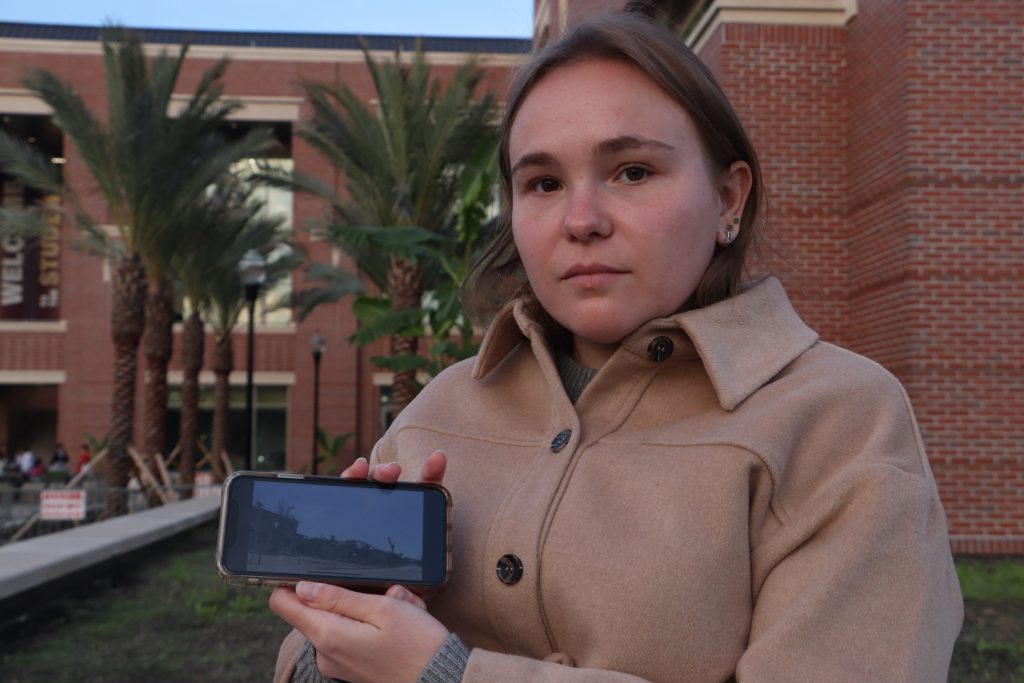
Kozlova speaks both Russian and Ukrainian, but she often uses terms that are a mix of the two, because that is how and what her village spoke. Sometimes, when she’s talking to other students at FSU who speak Russian, Kozlova said, they become confused when she says certain terms.
Hearing from close friends and family in Ukraine and Russia offers Kozlova different perspectives. Many people in Russia, for example, don’t believe that the war is going on, Kozlova said. Since the government largely controls the media, many, including her family, only know what it shows them on TV. Some believe Ukraine is bombing itself, she said.
Kozlova said she has learned to read with a filter when reading articles published by U.S. media, often looking for holes. Rather than read about the conflict through central news outlets, she reaches out to people whom she knows on both sides.
“Probably now, I’m even more in between,” Kozlova said. “There are more people involved in this conflict in terms of politicians and countries. And I realized that maybe for some of them, it is even beneficial to have this kind of war. I don’t know how exactly it is beneficial, but it is.”
When she was 6, Kozlova gravely injured her back, furthering a condition she was born with, both of which have combined to confine her to a wheelchair for the rest of her life. If as a child she wanted to study at school, she had to do so on the first floor, or not at a because most areas in Russia were not inclusive to those with disabilities. “They put people with physical disabilities and intellectual disabilities on the same level,” she said.
Now, living in the U.S. with her husband, she worries for her friends in Ukraine who have disabilities: “Some of them have to sit all the time, have to hide somewhere in the basement all the time; some of them do not even have access to go to the basement.”
And yet, she notes, “ But it’s really, really, really hard for everyone.”
A miracle in early 2022
In 2017, Kozlova was accepted into an exchange program through the U.S. government to study at the University of Wyoming. During her time there, she said her views shifted completely regarding accessibility watching and experiencing how people with disabilities were treated.
Kozlova returned to Russia for two years and taught English. While there, she applied to return to the U.S. and accepted a graduate assistantship at FSU in August 2021. She returned to Russia again four months later in hopes of marrying her boyfriend and then him joining her in Florida. First, though, he needed a green card accepted, which could take months, or worse, years.
Two weeks before the war started, he got an interview appointment at the U.S. embassy. She caught a plane to Kazakhstan to meet him. However, before he flew to Florida, the war began, ticket prices soared everywhere, and flights became scarce. Luckily, her husband secured a flight and made it out of Ukraine right before the draft started, she said.
“Some miracle probably helped us,” Kozlova said.
Her aunt still lives in Ukraine, and tries to keep in touch, but oftentimes the relative doesn’t have an internet connection. Sometimes it will be days without an answer. A hole deepens in Kozlova’s stomach as she waits for messages.
Since the war started, Kozlova has tried to convince her family to leave their country. Her older brother lives in the border town where she grew up. The Russian army has been recruiting men to go to war, and Kozlova has begged him to leave, worried he may be drafted.
Kozlova said it’s too dangerous to go back herself. She and her husband have posted things on social media in solidarity with Ukraine, which in Russia, can get them arrested, she said.
“We are worried here probably even more than they are there,” Kozlova said. “In September, I literally was arguing with my family members, with my brother, like, ‘Hey, maybe it’s time to leave … just because if they take you, who will take care of your daughter and your wife?’
South Florida is home to large populations of both Ukrainians and Russians alike. For many people in the area, however, helping Ukraine is a necessity.
Raphael Nagli, a native of Latvia, and president of Florida for Ukraine in Hollywood, works to help refugees and send aid to key areas in Ukraine that have been bombed. Five hundred people came together in front of Hallandale Beach City Hall to protest on the first day of the war. A few days later, more than 3,000 people stood in solidarity with Ukraine.
Hallandale was extremely supportive – and was the first city in the U.S. to raise the Ukrainian flag when the war started, said Nagli, whose mother and girlfriend are from that country.
With 10,000 members, Florida for Ukraine works out of a warehouse accepting clothing, food and other necessities to send overseas. Besides sending supplies back home, it also dedicated many hours and resources to help large groups of refugees arriving in South Florida.
“We were engaged from the first day,” Nagli said. “It was advocacy because, obviously, Ukraine couldn’t defend itself, because Ukraine is a much smaller country than Russia. Ukraine desperately needed help. Every day that was passing more lives were lost.”
A slice of Russia in Gainesville
Tatiana Gromova, 64, owner of Euro Food Basket in Gainesville, has used food to bring cultures together for years.
Within the walls of the quaint shop on NW 34th Boulevard, breads, jams, crackers and cookies stack high on shelves, with paintings and European artwork sitting beside the products. Vivid colors come to life as stringed lights dangle around the shop. It’s where people can come to get food that makes them happy – food from their childhood, Gromova said.
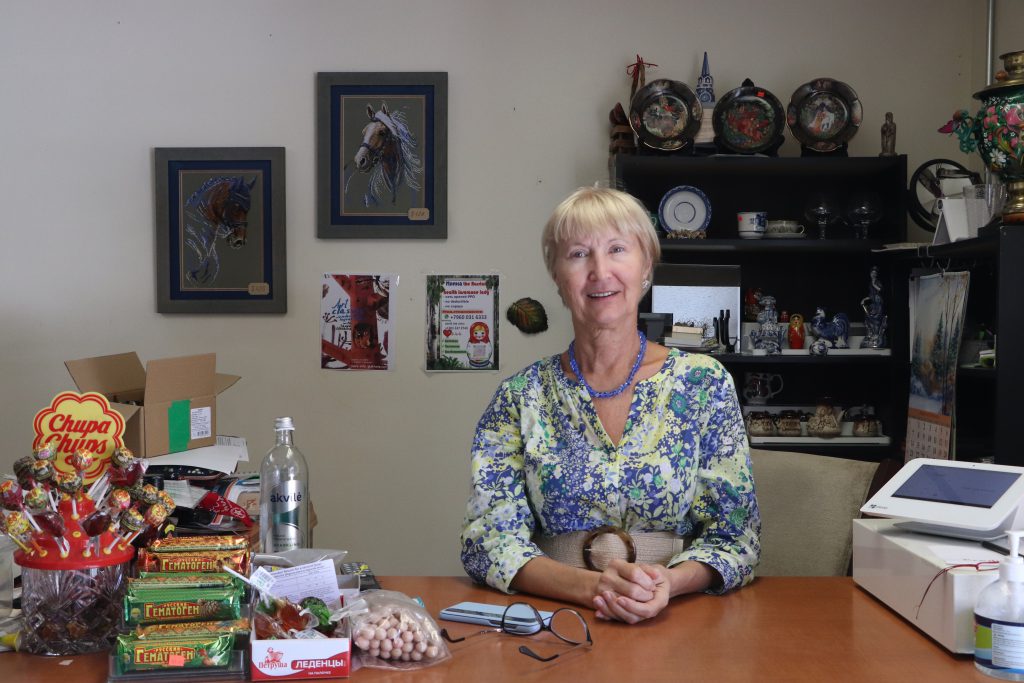
In what she calls her “first life” in the Soviet Union, Gromova lived in the Czech Republic.
“The country I was born doesn’t exist anymore, which is very sad, very upsetting to me, and so many people that I talk to as well,” Gromova said.
Born in the Port of Odesa in Ukraine, Gromova recalled how life was very different there from what it is now. She was an interpreter and English teacher in Russia before she left to come to the U.S. in 1992, and she’s owned Euro Food Basket since 2017. Hers is the only Russian food store in Gainesville, and most of her customers are either UF employees or students.
While business hasn’t been too affected by the war, people who come in are more opinionated than before, Gromova said. Some people will come in and only buy Ukrainian products, and vice versa with Russian products. Additionally, supplies have been harder to get in quickly, she said.
“You never know when the next shipment will come,” Gromova said. “At first, I was very upset, but I’m happy to have clear blue skies, so if I cannot get products, it’s like, ‘I am lucky to have the store and to live a peaceful life.’”
While she cannot stop the war, Gromova said her goal in the meantime is to show compassion towards everyone on both sides.
“We need to unite people,” Gromova said. “The only way we can control the situation is to be human to each other.”
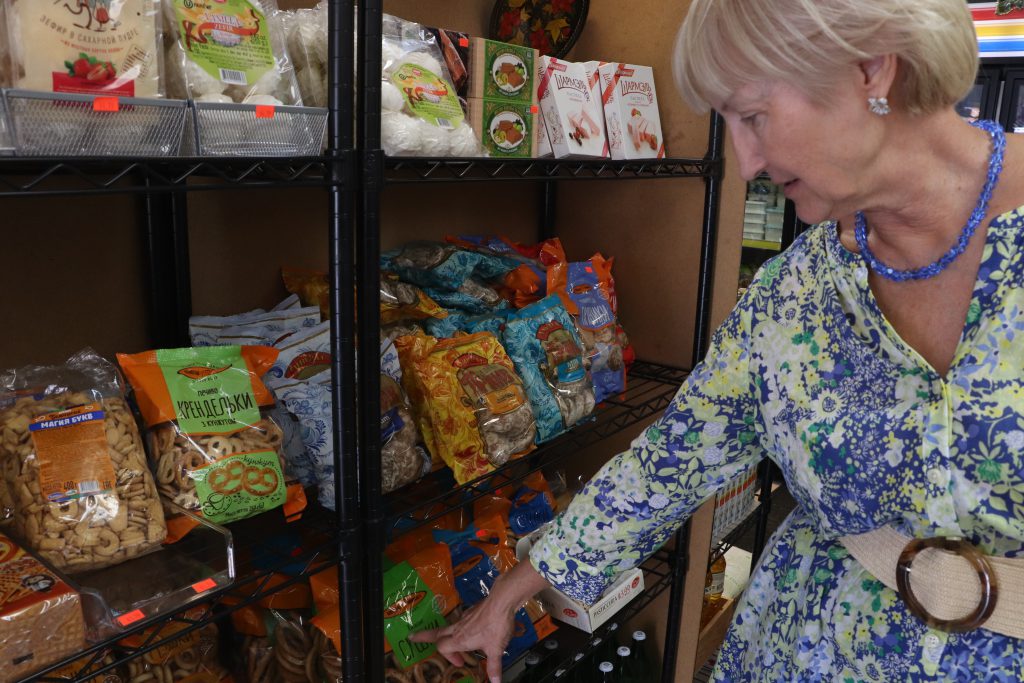
 Special Report from WUFT News
Special Report from WUFT News